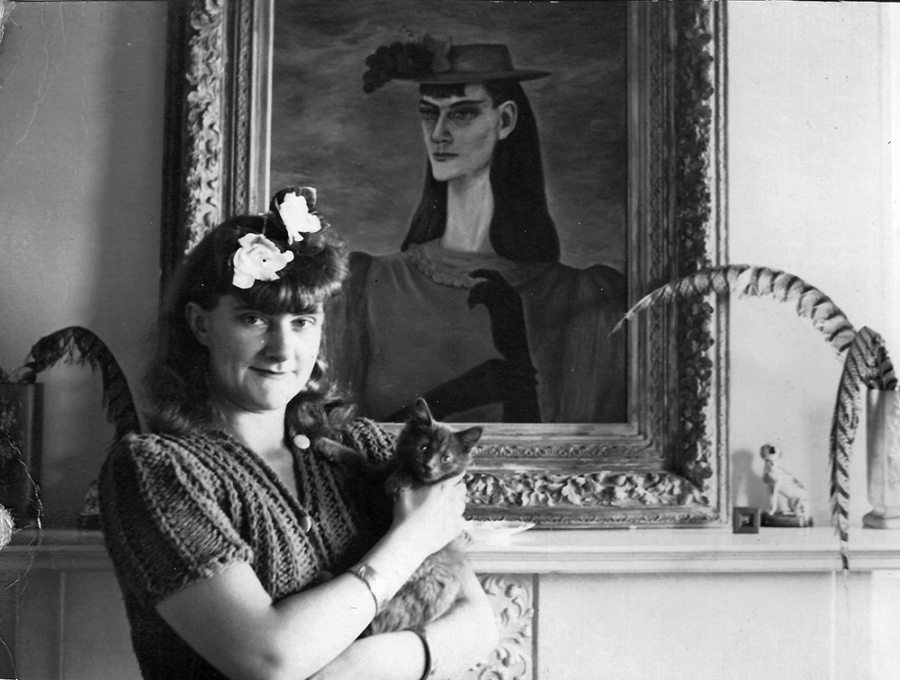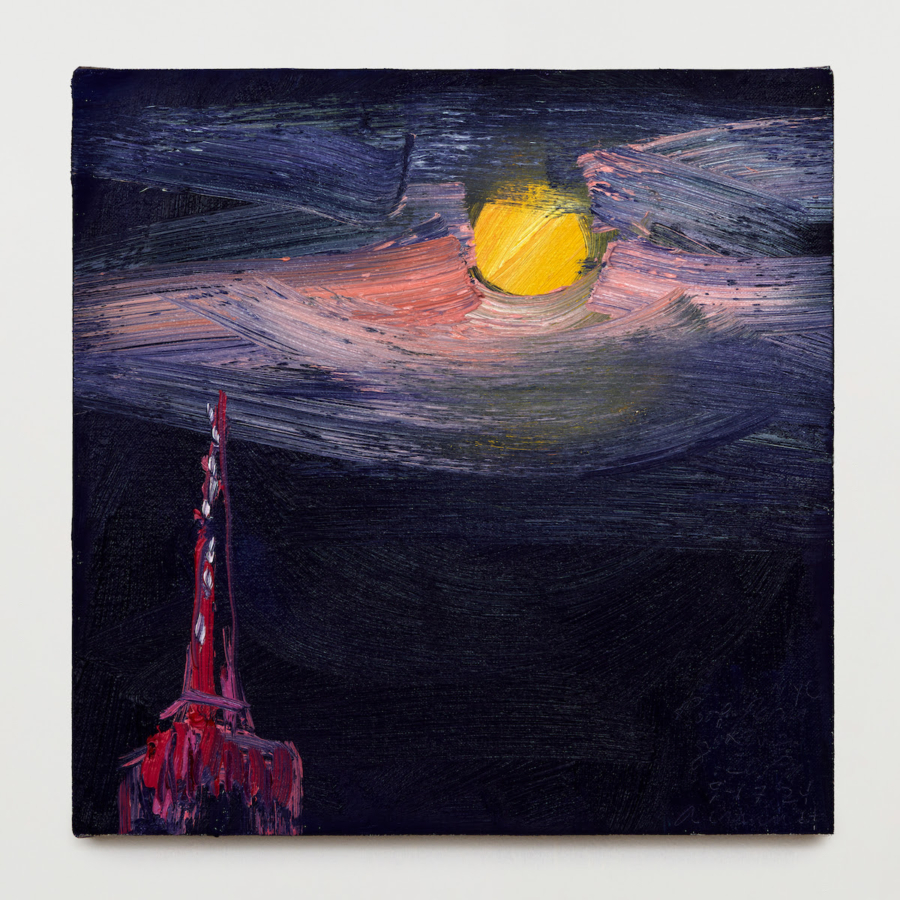Gertrude Abercrombie, published by Karma, New York, 2018.
Download as PDF
View Gertrude Abercrombie here
In the early seventies Gertrude Abercrombie began to record a series of personal anedotes and stories which she referred to as her “Joke Book.” It was an important creative activity of her later years. Although she did inscribe many of these stories in a notebook toward the end of her life, she had recorded most of them elsewhere (generally on scraps of paper), and had also related many of them to friends. It is significant that the “Joke Book,” like Abercrombie’s painting, is related intimately to the life she led and therefore offers another kind of insight into this remarkable person. Since the “jokes” represent a chronicle of Abercrombie’s life, carefully edited and honed, they have been arranged thematically in an effort to illuminate this life.
—Susan Weininger, 1991
A man, a well-known scholar—he worked on the atom-bomb project—asked me why I painted the moon in a room, and I said, “Yes it is a puzzle. Why is it anywhere?”
The point of contact is where the viewer meets the artist’s idea, emotion, or experience.
“Yes,” said Miss A. “I have a bump on my arm where one of my paintings fell on my head.”
Lee Montgomery (“Gracious”) Taylor was the one who took me to Joy, Illinois.
We went to the tavern there, it was owned by Freddy Anderson’s mother. And he always would say, “A Hamm’s please, a Hamm’s please,” that was beer. And I didn’t drink anything in those days but I had a Hamm’s with him anyway, and after a couple I had to use the mens room or whatever and they didn’t have one, you see, they just went out back. But they didn’t want me to go out back. The waitress came to the table and she said “Yes, just follow me,” and we went way down the street and there was some empty building there and she took me upstairs and there was a room, a great big room, and in one corner of it there was a little toilet, and way over on the other side was a shelf, and on top of it was a stuffed owl. Well, it was just so pretty that after that I made many paintings of that and sold many [Toilet at Joy, Illinois]. I made several paintings because I liked it so much … years after that happened I went down there with my husband, Bob Livingston, and I said to Freddy, “You know when I was down here ten years ago or so, or fifteen or twenty, there was a stuffed owl in that room down the street and I would just love to own that stuffed owl.” Well, he inquired all around town and he found the man who used to own the property, and he said “No, we have never had a stuffed owl. But you know, of course the owls did come in through the windows all the time and they just sat there.” That’s true. He never blinked an eye all the time I was in the ladies room. It’s true.
My mother made two jokes. I was dying for a corduroy suit in 1934. There wasn’t one bolt of it in any Chicago department store. My dad (a great buyer at wholesale) talked a buddy into sending to New York for a few yards. It was stiff as a board. Heavy. Good. As mother plied her needle on it she said, “Next time you want a corduroy suit made, get a carpenter.” Weak, but she tried.
We went downtown to see a Mr. Schute—a jeweler. She said, “Oh shoot, he isn’t there.”
My dad made many. One—he was looking through a catalogue. He was to get prizes for having sold more Addressographs than others. Mother wanted a new mattress and my dad wanted her to have a new wrist watch. She gave in when he said, “There’s just as much ticking in a watch as there is in a mattress.”
There was a fellow that lived in our building, the Weinstein Building on 57th and Harper a long time ago, thirty-five years ago. His name was Freddy Pestone. One night he asked me to go to the Tower Theater with him to a movie and so, ok. So we walked over there and as I remember it was a serious movie and right in the middle of it all something happened, my hair was just grabbed from behind and I shrieked mightily, and I kept saying, “What’s wrong, what’s wrong?” and the usher came running down the aisle and said, “Madam, if you don’t stop shrieking we’ll have to throw you out,” and I said, “I can’t go out, I’m caught, something is caught.” And Freddy looked around and he said, “Well, you see, there is a man trying to get into a seat behind you and you’re caught in his fly. Your hair is caught in his fly.” I don’t know whether it was buttons or a zipper, I couldn’t look around. And it went on and on for like five minutes, everybody screaming and laughing, and I began to get hysterical. And he couldn’t get loose and I couldn’t get loose. And finally I said, “Somebody get a knife and just cut it off.” Because I didn’t care, you know, the hair grows again. The man was just mortified. Yes, that was quite an event. They finally did cut us loose and then, well, we went home then because we were just hysterical.
Dizzy Gillespie saw my black cat and said, “What kind of cat is that?” I said, “Spayed.” He said, “Yeah, I can see that.”
Ted Friedman (tenor player) came into the library where I was adjusting a tape recorder in preparation for Sarah Vaughan’s coming to sing. He said, “What kind of a dog is that?” I said, “I don’t have a dog—that’s a cat.” He went out and came back and said, “No, that’s too big to be a cat.” I said, “Well, our cat is really big.” He went out and came back and said, “Man, is that a big cat!” I went out and there was Sarah with her Great Dane. [Frank Sandiford is actually the protagonist of this story. Abercrombie adjusted it because she had edited him out of her life by the time she entered the story in her “joke book.”]
When eminent composer Ernst Krenek lived here he wrote an opera—but never played the piano except by request. And it sounded mighty strange. Twelve-tone scale and plucking of piano wires, etc. One day when we thought he was out, we heard him playing a little more melodiously. I tiptoed upstairs to express surprise and there, behold, was my cat daintily going up and down the keys.
I was on the way to a gallbladder operation. They gave me a shot of something that made me higher than a kite and very talkative. So happy! They gave me gray hip-leggings and a shirt to don, and I asked if these were my travelling grays. Either they knew naught about baseball or they were glum. No laughs. To me it was hilarious. Then a tall handsome negro in horn-rimmed bop glasses came to wheel me down. He looked hip, so I asked him if he liked jazz. “Oh yes,” he said. “Who in modern jazz?” I asked. “Well,” he pondered, “I like Dave Bluebeck.”
A lady was at somebody’s house and there was talk about art. She fell into a swooning position and said, “Oh—I just love Pizzacato.”
In 1970[?], a new letter carrier. Mr. Hightower. The name made me think of the ballet queen Maria Tallchief. The next time I saw Mr. Hightower I was so afraid I’d call him Mr. Tallchief that I said, “Goodbye, Mr Lightfoot.”
The Mozambique man came in and I said, “You always have a toothpick in your mouth.” He took it out and said, “Thank you.”
I got a batch of marble fruit and put it in a compote—peach, pear, banana, grapes, etc. My dear cleaning lady saw them and approached them slowly. As she reached them she said, “Oh, at first I thought those were fake.”
Lila Leeds looked at my grandmother’s painting of a dog. “That’s a good likeness, isn’t it?” Me: “I don’t know. I never met him.”
Sebastian Blink told Karl he once wanted to be an artist—but thought he couldn’t because he was colorblind. He said, “I later realized that shouldn’t have mattered since the names of the colors are printed right on the tubes.”
Sebastian Blink was taken to the circus by Karl. When he saw the elephants he said, “What are those?” “They’re elephants.” “Good name for them.”
Mrs. Bazzi was my roommate for a while in the hospital. (I called her the little old lady—and it turned out she was six months younger than I.) We were talking about old, old people who were incurable and really should die. “Yeah,” she said, “They just lay there like a bunch of vegetarians.”
Richard Gregg’s mother died and I was invited to Bilger’s funeral home. I was living on ninety-four dollars a month so could not spare a lot for a wreath. I went across the street and got a little bunch of violets (maybe one dollar). As I walked down (up) Harper a little old lady dressed all in black approached me. I was afraid she wanted a dime or something so I tried to avoid her. But couldn’t. She got right in front of me and said, “A sweet bunch of violets.” Of course they were completely covered with paper. She had NO way of knowing what I had. I flipped.

Gertrude Abercrombie holding Mercy in front of her painting Self Portrait of My Sister, c. 1941
A Pleasant Smile
My father’s older half-brother was a “watchmaker and jeweler” for over fifty years on the South Side of Chicago. By the time he had lost almost everything, he had his store in a tiny 6 × 60-foot place [an apartment over a partly finished garage]. He lived in the back. I was both attracted and repelled by the back part, and ventured to the rear only few times. It was unbelievably dirty and messy. Once when I was there I looked up at a very strange hanging structure made of old boards. “It’s my mezzanine floor,” he explained. Hanging from the tall, old-fashioned ceiling was indeed a mezzanine floor. Hooks and ropes held up old boards which in turn held trunks, crates, and cardboard boxes full of (I learned later) just junk. Heaven knew what was in all the boxes and crates that were stored on these hanging gardens. When he finally got too old and sick to run his store, my father found out that there were thousands of worthless watch parts, bits of lace, ancient fur coats, and old cans of salmon, among other things. Junk men came. It took weeks to get Uncle Charlie into the old men’s home, and it took $500 which was nearly realized after the junk men came. He reached his mezzanine floor by means of the same old ladder which was used to gain entrance to the more elegant house he had inhabited twenty years before.
One time there was a big family reunion at our little home town near the Mississippi. Uncle Charlie was also an expert photographer and thought he knew more about cameras than anyone. Of course he wouldn’t then let anyone else take the family portrait, which consisted of some twenty-odd people.The results were marvelous. Uncle Charlie set the camera on the time—then clicked the shutter, came and stood briefly with the group, and then went back and closed the shutter. I have the picture and in it Uncle Charlie shows up to be the ghost that he is indeed today.
During all the years that I took our watches to Uncle Charlie he gave only one answer when I asked how much the bill was. I’m sure my father was always aware that Uncle Charlie wouldn’t charge anything for the repairs, but it never failed to surprise me when he replied, “A pleasant smile.”
Published on the occasion of
Gertrude Abercrombie
August 9–September 16, 2018
Karma
188 East 2nd Street
New York, NY 10009
Organized with Dan Nadel
Published by
Karma Books, New York
Edition of 1,000


